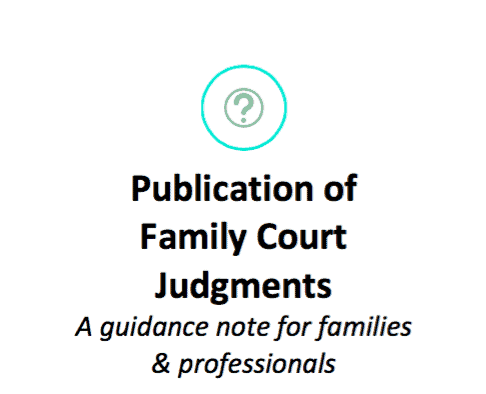We’re very pleased to publish a new guide to help parties caught up in the family justice system navigate the complicated issue of publishing judgments about private family matters. Our guide aims to help those dealing with cases involving privacy issues affecting children and adults :
Publication of Family Court Judgments – A guidance note for families & professionals
The guide is directed at families and the professionals working with them, to help them think through the possible pros and cons, and the potential practical consequences of publication. Rather than focusing just on issues of anonymisation and jigsaw identification, we hope to involve families in the decision making process about publication, and with the process of anonymising judgments so that privacy protection is robust and effective.
We produced this guide because we realised that there were no materials for families involved in family court cases to help them understand when, why and how judgments in their case might be published, and we wanted to fill that gap. It isn’t practical or appropriate for every judgment in every family court case to be published, but we hope that it will both help make sure judgments are reliably anonymised before publication, and help families and professionals to support publication where that can be achieved without jeopardising the family’s privacy or welfare. We hope that our guide will be used by lawyers, social workers and children’s guardians to talk through questions of publication of judgments with the children and parents they are working with, so that safe transparency can be facilitated where possible, and unnecessary anxiety avoided.
The guide can be used as a tool to assist parents and their lawyers to discuss and think through whether publication is likely or appropriate in their case, and if so how it should be done, and can be used by social workers or children’s guardians to work through similar issues with older children, depending on their understanding and maturity.
Publication of this guide has been made possible by a grant from the Legal Education Foundation.
The guide is not judicially approved guidance.
Download press release relating to the launch of the guide.
Read our other guidance notes.

As you state “Not judicially approved guidance” …………….. worthless till it is……
Worthless?
so it is ‘worthless’ to attempt to set out clearly law and practice, to assist those who might otherwise not have a cat’s chance in hell of understanding what is going on?
I have a different definition of ‘worthless’ to you.
To criticise is easy. To do better, may be hard.
need advice safe guard had some allegations about me by my x who smashed my house up.iasked for my daughter stay at her dads as my house assent liveable.after aligations safe gaurd kept [her] at her dads..naw theres no case no safe guard but my daughters dad deneying me all contact. [she] was in my full time care 8yrs shes to young decide.theres no court orders in place nothing ive read up on ss it says they carnt take your kids unless danger theres none she didn’t see anything.it also says my daughter shud be returned but no ones listing ive emailed social serves ive called safe guard left messages. what can i do &were do i stand pls help im distrought.
Joanna, It sounds as if you should go and seek some advice from a lawyer who is a specialist in family law. You may qualify for legal aidi if you have been the victim of domestic abuse. I’m afraid we can’t give legal advice at The Transparency Project but please do contact a lawyer. You can search for legal aid lawyers by postcode on http://www.gov.uk. Lucy (PS I’ve edited some identifying detail out of your comment)